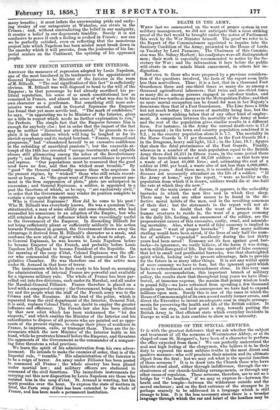THE NEW FRENCH MINISTER OF THE INTERIOR.
AMONGST the measures of _repression adopted by Louis Napoleon, one of the most barefaced in its tendencies is the appointment of General Espinasse to be Minister of the Interior in the room of M. Billault. " The real signification of this fact" is sufficiently obvious. M. Billault was well disposed to bend to the will of the Emperor ; to that personage he had already sacrificed his po- litical reputation, his sense of so much constitutional law as remained in France, and almost his sense of what was due to his own character as a gentleman. But something still more sub- missive was wanted, and in General Espinasse the Emperor has found that yet more servile tool. "The mark of confidence," he says, "in appointing me to be Minister of the Interior, gives me a title to respect which needs no further explanation to you," the Prefects. The simple fact that the Emperor favours him is enough for anybody else ; but in order that the import of the fact may be neifher " distorted nor attenuated," he proceeds to ex- plain it in that address which will long be laughed at for its slavish sycophancy and its insipid bombast. " France, tranquil and prosperous," had "abandoned herself to an excessive confidence in the subsiding of anarchical passions "; but the execrable at- tempt of the 14th has revealed " savage resentments and culpable abuses still glimmering among the ashes of the Revolutionary party "; and the thing wanted is incessant surveillance to prevent and repress. " Our populations must be reassured that the good need have no fear, and that the wicked must tremble." By " good " the General confessedly means those who acquiesce in the present regime, by " wicked" those who still retain resent- ment or hopes. As " the great want of France at the present mo- ment is the firm suppression of plots," plots are anticipated in succession ; and General Espinasse, a soldier, is appointed to a post the functions of which, as he says, " are exclusively civil," in order that the Government may render its position complete to sustain a siege against its opponents. Who is General Espinasse ? How did he come to his post? Who M. Billanit was everybody knows. He was a quondam Con- stitutionalist, a man of some ability and some character, who had reconciled his conscience to an adoption of the Empire, but who still retained a degree of influence which was exceedingly useful to the Government of the Emperor. In discarding. Billault for not being sufficiently pliant or sufficiently soldierly in his action towards Frenchmen in general, the Government throws away the advantage it derived from M. Billault's character as a mask, and confesses the new style of rigour which it is about to adopt. As to General Espinasse, he was known to Louis Napoleon before he became Emperor of the French, and probably before Louis Napoleon left England to become President of the Republic. On the morning of the coup d'etat, Colonel Espinasse was the offi- cer who commanded the troops that took possession of the Le. gislative Chamber. He was therefore one of the active men under St. Arnaud in that hour of terror.
The instruments which he finds ready to his hand on assuming the administration of internal France arepowerful and available for a vigorous military rule. The whole of France has been par- celled out into five divisions, each under its Marshal, and all under the Marshal-General Pelissier. France therefore is placed on a level with a conquered country ; the Government being to the coun- try and the people what the staff of the French army was to the Crimea and the Russians. At the head of the police, which is separated from the civil department of the Interior General Niel, it is said, replaces Colonel Pietri, no doubt to employ the greater influence and efficiency. The French law also has been altered by that new edict which has been nicknamed the " loi des suspects," and which enables the Minister of the Interior and his subordinates to dispose of all persons who are pointed out as oppo- nents of the present regime, to change their place of residence in France, to imprison, exile, or transport them. These are the in- struments which the new Minister of the Interior holds in his hand, while he prostrates himself before the Emperor, and threatens the opponents of the Government as the commander of a conquer- ing force threatens a rebel province. We learn the spirit of his administration from his own adver- tisement. He intends to make the enemies 4f order, that is of the Imperial rule, " tremble." His administration of Interior is to be a reign of terror. An army under lielissier has been posted to command all France ; the whole country has been placed under martial law ; and military officers are stationed in command of the civil functions. The immediate instruments for carrying out this new disposition by Louis Napoleon are those who assisted him in the coup d'itat. St. Arnaud is wanting, but his spirit presides over the hour. To express the state of matters in brief, the Paris coup d'etat has been extended to the whole of France, and has been made a permanent institution.


























 Previous page
Previous page